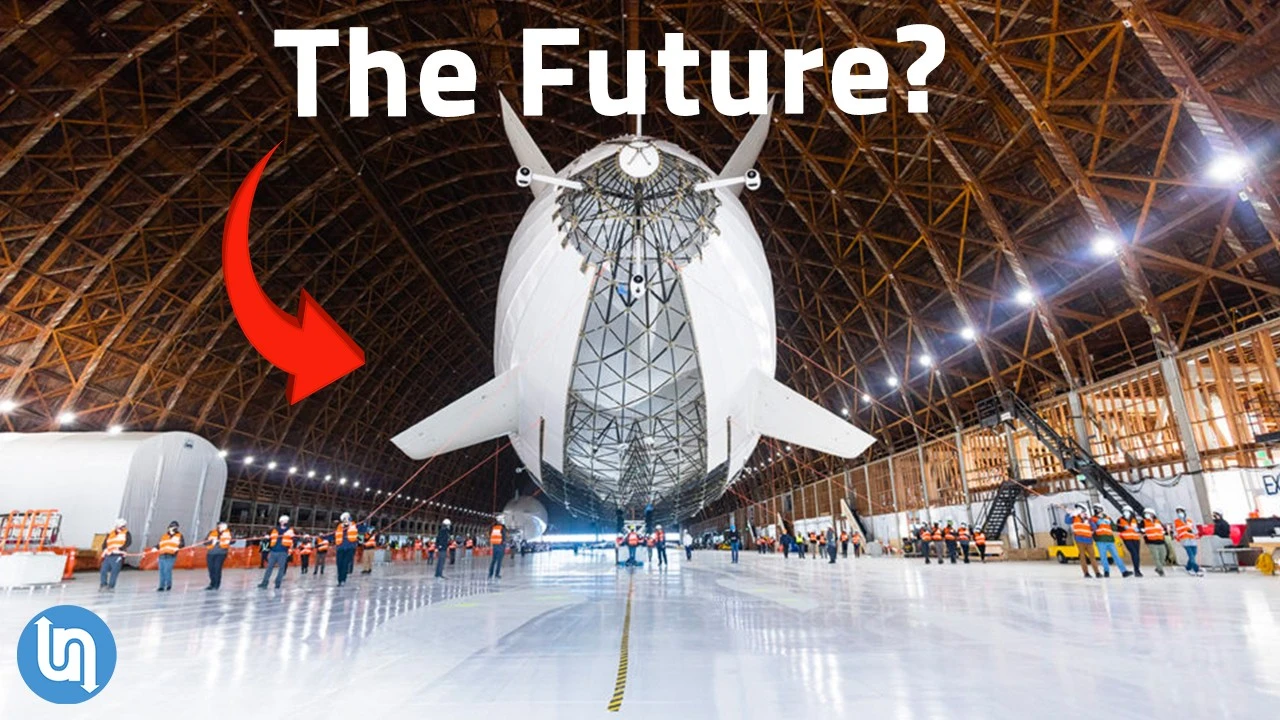Question mark headline rule applies. No, of course airships are not the future. They’re cool as heck, though. I’ll give them that.
Any headline that ends in a question mark can be answered by the word no.
Doesn’t mean an article isn’t worth reading ;)
I hope so. I don’t think there’s a better way to achieve air transport free of greenhouse gas emissions than with airships.
Plus there’s some really cool potential in moving bulky cargo (like windmill parts) overland where you’d otherwise have to cut down trees, take down power lines, and remove other obstacles around highways or train tracks. Plus the ability to act as a flying crane has some cool potential in stuff like delivering modular hospitals and other aid to disaster areas.
People have been pushing this for awhile. It’s not going to happen.
Pathfinder 3, at 600 feet long and 100 feet in diameter, is designed to carry about 20 tons ref
and its cruising speed will likely be comparable to Pathfinder 1 at ~70 kph (dependant on relative windspeed).
By comparison, the Airbus A350F has a payload capacity of 109 tons and a cruising speed of 900 kph, and doesn’t care about relative windspeed.
So the airship might deliver 20% of the cargo at 8% of the speed. This isn’t useful. There is no use case in which this will make sense.
It’s a luxury air yacht pipe dream for rich people, a hobby for a bored Google founder who doesn’t know what else to do with his money.
It can deploy to and from harder to reach locations that don’t have enough space for large planes to land.
For this kind of need there are already several types of cargo helicopter which will make the same delivery faster, be able to land in a smaller area, and not have to worry about local wind conditions.
Maybe people will accept certain types of freight not travelling at insane speeds?
No, shareholders would weep bloody tears.
Have to end Just In Time delivery which basically every business works on now for it to even be suggestable.
Jammed In Trailers, you say?
Certain types of freight are already expected to travel slowly… but mostly heavy/bulky items that don’t make sense to put on an aircraft where weight and space come at a premium. That calculation isn’t really going to change with airships, it will still make more sense to put those items on a train, a truck or a boat at much lower cost.
Really the only reason to ship cargo by air is the speed… if you can’t get the speed why bother with air at all?
If we can get serious eco reforms done (and the word “if” is doing a lot of work here) it’ll come down to which has the least emissions per mile.
We could also do more airship freight to facilitate economic growth in places that have poor infrastructure, or through terrain it would be too damaging to cut a highway through.
But then, when have we ever sacrificed money for a better world?
I think a better luxury air yacht could be done better: Make a lightweight house boat. Attach a n airboat drive. Fly a pioneer aerospace parafoil off the deck and sip mimosas on the deck while cruising at 28mph over the Amazon basin.
As like a personal private yacht? Do you also own a private hangar and work crew for maintaining your personal air yacht? Are you Sergey Brin?
Houseboats don’t take much maintenance or hangars. Yes certainly my own private flying yacht. I don’t want to share it people I might not like.
That’s because we’ve been stuck with an irrational mode of production that requires too many people and goods to get far places quickly while burning lots of fossil fuel. A more logical system would only have people traveling by jet and helicopter on an emergency basis. People traveling on vacation or non-emergency business should be able to slowly cruise in relative comfort on battery and solar power. Airship ports can be built along the paths of the atmospheric streams and then rail can be used for the next leg of travelers’ journeys.
As far as capacity goes that’s just a matter of building bigger airships and using relatively cheap hydrogen instead of helium as the lifting gas.
Realistically, the current air travel infrastructure wasn’t built on tourism, it was built on serving business needs - freight, personnel movement, meetings, sales. You’re talking about replacing that infrastructure, or at least competing with it, while also being dependent on rail infrastrcuture…
In order to grow this airship system will have to offer some substantial practical advantage over the existing one. The thing is, if I’m shipping something and speed isn’t important then rail/truck is fine and I don’t see airship freight being cheaper than that. So if the airship doesn’t fit the fast/expensive use case, and it doesn’t fit the cheap/slow use case, then what is the competitive advantage?
As far as capacity goes that’s just a matter of building bigger airships
There’s a practical upper limit to how big these things can be. Regardless of fancy new structural materials, it’s a giant gasbag… the larger it is the more of a problem any crosswind is.
using relatively cheap hydrogen instead of helium as the lifting gas.
It’s going to be a long time before any safety oversight group gets on board with this.
Most freight should still go by sea and rail. There’s no beating those modes especially if the railways get fully electrified and container ships transition to nuclear power. The case for long distance point-to-point transport of large, special equipment is still there, but I don’t think it really changes the world. Rather, the substantial, practical benefit of airships is moving people more humanely and with lower greenhouse gas emissions. Video conferencing and telepresence is good enough these days that there isn’t a good reason anymore for people to cross oceans in a matter of hours except in an emergency. Eventually, emissions costs will stop being externalized and at that point airships could fill the fast-enough/cheap use case.
I don’t understand what you mean about crosswinds being a problem. Increasing the lifting capacity of an airship only increases the effect of crosswind relatively modestly. That’s because a given increase in the relevant cross sectional area of an airship roughly corresponds to a square increase of the volume, which directly correlates to lifting capacity. To think of it another way, any crosswind penalty to increasing the lifting capacity of an airship can be negated by allocating some of that additional capacity to increasing the available thrust of the propulsion system. Therefore, crosswinds become less of a problem for airships as they get bigger.
There are already robust standards in place for working with hydrogen and as of 2022, the EU has adapted their regulations to allow for hydrogen as a lifting gas. It is still prohibited in North America, but the FAA is already giving initial approval for hydrogen fueled airplanes, which of course requires high pressure hydrogen fuel tanks, an arguably riskier proposition than ambient pressure gas cells. Anyway, it seems like one way or another, hydrogen is the future of flight.
I love that even this modern day pitch has to clarify that its not hydrogen
Have we been waiting for it?
Really fun and all, but it’s obsolete by alternative forms of transport. Like a helicopter for example. It can fly almost always, maybe lift a third of an airship, but an airship can’t fly with anything more then just a little bit of wind. The very instances where an airship prevails over other forms of transport are so few, there’s no market for it. But that doesn’t stop startup companies to hoard money, build prototypes, develop super awesome machines, then to discover it’s useless and obsolete while having burned load of money and producing massive amounts of carbon emissions. The concept is really great, but only in perfect weather conditions. But still 3 helicopter flights could do what an airship could, but faster and more reliable. Or trains or ships. There’s no gap in forms of transportation that needs filling.
Yeah but helicopters require fuel and I don’t know if you’ve been paying attention, but using fuel makes climate change happen.
Companies choosing profits over climate make climate change happen. Those companies rather use more reliable, cheaper and faster helicopters. Have fun convincing them to cut deeply into their profits to save the environment. Look, people in general should care more about our planet but they just don’t give a shit.
You could make the exact same argument for any mode of transportation. And there are many possible applications for airships that are not possible with current technology, for example 100% carbon free overland travel in remote areas.
The wind issue is also not nearly as bad as you make it sound. Basically it is only a problem during start and landing or very high winds (which are also problematic for helicopters during start and landing). If you have small electric quad-copters that shuttle passengers and cargo to and from the airships it is basically a non-issue.
Plus there’s a design for one with a winch system that can lift sea cans up into its cargo bay without landing at all.
Yet other forms of transportation already exist and are well developed. Out of the years of experience in development we know that speed and efficiency is key. We need to move goods as cheap and fast as possible.
Airships were only abandoned because in the 1930ties fuel was extremely cheap and military applications for airplanes reigned supreme. Airships are actually vastly more efficient than airplanes and fast enough to beat most other modes of transportation.
Planes are less efficient, but extremely fast. Weight to speed ratio, airships are a joke compared to ships. Transportation with airship is way more expensive then a container ship. It may be better for the environment, but companies care about profits, and it’s the companies using the service. Either it needs to travel fast for more money with planes, or slow in bulk for cheap. Slow and expensive makes no sense. It makes sense to you and me, caring about the enviroment. But I’m not importing and exporting goods on a massive scale.
Ships don’t work on land, and trains/trucks require expensive infrastructure.
Once the technology for airships is out of the re-development phase again it will favour very well cost-wise against other land-based options (of course container-shipping is hard to beat).
Trains need expensive infrastructure, yes, but it’s already there.
I sure hope airships make it, as it could be a very eco friendly alternative. But I highly doubt it will be able to win from conventional forms of transportation.
buddy what are you not getting about “fuel makes the planet hot we should seek alternatives”
also we superduper do not need to move goods as cheap and as fast as possible, that’s some capitalist dogmatic brainwashing
It’s companies which are the ones moving the goods. I agree we all should change, I’m against capitalism, but good luck convincing companies to cut deeply into their profits.
Who the hell wants a two-day blimp ride to London?
I think that was an Archer reference, but I’d rather spend two days on an airship with a bunk, a dining room, and a bar, than seven hours stuck between potentially two of the worst people I will ever meet and with barely any room to stretch my legs.
It’s a nice thought, but frankly if you have the ability to spend your time like that while traveling then you’re probably already in the target market for this… wealthy people with money and time to burn. How often do you find yourself booking train cabins for long-distance travel?
And yes, it absolutely was an Archer reference.
Wealthy people already have their private jets. The only way it makes sense for regular people to cross the Atlantic in less than eight hours is for it to be a nominally miserable experience while of course burning lots of fuel with all the negative externalities that entails. Passenger jet forces us to put up with some significant problems and I think airships are just a better way.
I mean it would be a fun experience, but so is taking the Quean Mary II and even she struggles to stay in the black dispite being eminently more practical.
Over land a train will always win, and in the ocean and in the ocean there are ships that can outrun it.
More to the point, people travel by air because it’s fast enough to get you anywhere in the world in a day, give or take. Biofuels and even direct fuel synthesis using atmospheric carbon powered aviation is always going to beat out airships because airships do not solve a useful problem for travel.
This is how I see it. There isn’t a practical use case that makes airships attractive compared to other options, and tourism will never be enough to sustain it at scale.
Have we not learned our lesson?
Most major transportation systems have catastrophic failures in their history, but are still around, and improved upon today. Ships sink, planes crash, trains detail, all with horrific consequences. When you look at the early track record on submarines it’s amazing to me that nation states kept throwing money at the deathtraps long enough for them to become viable. Airships had one crash almost a century ago and our society threw out the entire concept.
Modern airships have a ton of advantages over the ones from a hundred years ago, including tremendous improvements on handling, and the ability to land on the ground unassisted. Not painting the gasbags with solid rocket fuel to seal them seems like the sort of thing modern aviation engineering should be able to put in a checklist.
Safe, nonflammable helium!
Although this is a non-smoking area, sir.
We might not have enough helium for medical equipment, much less a fleet of airships. https://www.nbcnews.com/health/health-news/helium-shortage-doctors-are-worried-running-element-threaten-mris-rcna52978
Thank you, I was looking for this. Helium has important applications in science and medicine, and we cannot afford to use such large quantities for air travel. I’d much rather see development of modern sail ships, possibly in combination with fuel cells.
Plus imagine how hilarious it would be with everyone walking around with high pitched voices on the blimp. Straight up Alvin and the Chipmunks shit. That’s how it works, right?
Yes, they definitely fill the cabin with helium too because the entire ship has to be lighter than air.













